
“I’m not a medic, but I can help” - Thoughts on my volunteering experience
![]() John Howlett
John Howlett
![]() 16th October 2016
16th October 2016
Over the summer I took the unusual decision with my girlfriend to travel to Uganda and volunteer. This was something Lucy had thought about for years but was new to me. I assumed IT skills weren’t in the skillset of a volunteer in Africa, Lucy’s medical training being more of the stereotypical CV. Nevertheless I was encouraged that IT skills would be of use to the Palliative care charity Cairdeas we were going to work with.
I spoke with my managers and received support to apply for a leave of absence and to enjoy my time in Uganda. We began saving and paying for inoculations in preparation for the 7 weeks in Africa.
We arrived in July and our first impressions were getting picked up at the airport and the chaotic drive to Kampala, I had never seen, and probably won’t see, traffic as bad as Kampala’s traffic. Any odd ideas like “giving way” or “queuing” are clearly not on the driving test here. We’d soon get used to it though and were driving Ugandan style to work most mornings. Cairdeas aims to build a Palliative Care capability in developing countries, this was a great thing to be part of as I felt the team was making a lasting difference rather than a stop gap solution.
I was mainly organising the relaunch of this website which had been down for a relaunch for over a year. I spent much of my time in the office at the hospital working on the website or helping the nurses with their smartphones or PowerPoint, but on my last day in the office asked one of the volunteer coordinators Ivan if I could join him on a walk around one of the cancer wards. In Uganda most personal care for patients in hospital is actually performed by a friend or family member of the patient, 24/7. Most of the attendants sleep on the floor of the ward or under the patient’s bed. Nurses work across large wards and spend much of their time assessing symptoms and providing medication. The volunteers are people from the community who want to help patients who may not have someone to attend for them or need help getting prescriptions. These volunteers were the most inspiring thing I saw whilst I was there, they did so much good by listening and comforting the patients. It was truly humbling to see their dedication.
The health system in Uganda is limited by the standards I was used too, there were some free drugs available to patients but only a limited selection and a lot of pressure is put on the patient and family to come up with large sums of money for treatments. These commitments to treatments could often bankrupt families when terminal or long term illnesses were diagnosed. I found this so sad, especially when put into context by the corruption stories we would hear from the locals. The corruption in Uganda has got to such a stage that aid is delivered direct to not for profit organisations rather than to the government.
Looking back on it all I feel the best investment Lucy and I made and probably will ever make was the time we took to go to Uganda and to work with the talented and dedicated people of MPCU. We spent time working and teaching some brilliant people who will continue doing brilliant work whilst we are back at work in the UK. We saw lots of what Uganda had to offer, including a safari in Murchison Falls National Park and a trip white water rafting down the Nile. I would encourage anyone to take the opportunity to invest your time in something new, challenging and truly worthwhile.
As I type this back at my desk after our trip, getting used to the 9 to 5 and loving my bike ride to work again, I know that I’ve learned and experienced so much that will benefit me, and hopefully left some more IT literate nurses in Kampala! I'd like to thank the amazing MPCU team for being so welcoming. For anyone interested in knowing more about the work Cairdeas does, please look around the site and contact us.
Cheers, John
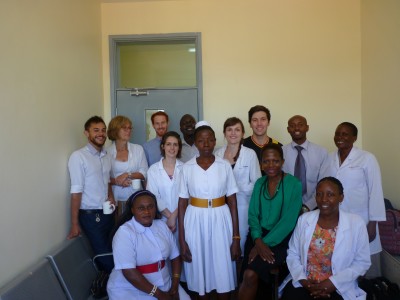
The Team
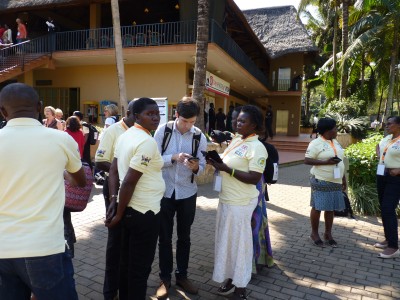
"Can you help me with Skype?"
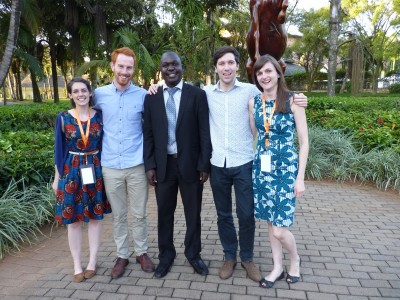
Bex, Jared, Ivan, Me and Lucy at APCA Conference 2016
Sharing the vision
![]() John Howlett
John Howlett
![]() 28th September 2016
28th September 2016
Greetings to all our supporters and friends and to those who share with us the vision for a world where palliative care is available to all. Thanks to all who have helped create this great new website and if you have not done so yet please become a FB and Twitter follower #CairdeasIPCT. We will also be putting on twice monthly blog posts with many of our team and partners contributing so please read, comment and think about contributing.
As partnerships are at the core of Cairdeas work we want to start with the words of some of the team at the Makerere and Mulago Palliative Care Unit (MPCU) in Kampala, Uganda who are our biggest partner. We shared these statements as part of our annual awareness month #cairdeaspalliative care #cairdeaspurpleparty but this was pre-website! This team has grown and developed as individuals and in professional achievements in the last 8 years and we are now starting a process of developing our next strategic plan. Huge sacrifices, significant commitment, love and friendship for each other, our students and mentees and in particular the patients and families we serve. Many thanks to all.
Florence who has been a nurse with the team for 5 years and a palliative care nurse for more than 15 years. She was one of the first nurse prescribers in Uganda (and therefore in the world!) and is involved in mentoring both nationally and internationally. The photograph with Dr Gursaran Purewal shows her love of colour with an outfit purchased during her visit to India to present at the international conference in Pune, 2016.
“Palliative care is very important. We found that around 80% of medical patients in Mulago need help from palliative care. We are few in palliative care and this is why we must teach and integrate others so that all can care, rather than always waiting for our team first to see the patients. They can do something for the patient first. We want everyone to speak the same language so that we can give the best care to the patients, to as many patients as possible, across the country.
For me being part of the MPCU team is very important and I enjoy it. But it can be hard. We can be short of funds.
I am also happy to mentor others. It takes me time to understand something but when I do I can teach it and when I teach others I feel happy. I want to inspire others. We are few in palliative care so we need to spread the knowledge. We must empower them.”
Our volunteers have so many stories to tell. Here is Toko Friday Santiago sharing from his heart. (photo with Ivan and our Cairdeas Trustee Jacqui MacIntosh)
"It’s been such a wonderful opportunity for me to volunteer with the palliative care unit for the past five years. I have gained numerous skills and experiences that I have not only used for the benefit of the patients here but also for my family members and friends. This gives me the desire to be part of the lives of the patients. The team has been so supportive and I have learnt communication skills, leadership skills and above all teamwork, which I have learnt is key in all aspects. Palliative care is so important, it improves the quality of life of the patients in offering physical, psychosocial and spiritual support which makes them feel valued and cared for."
Esther received one week’s training back in 2012 and worked as a link nurse on the surgical ward. This involves giving basic palliative care to the ward patients and referring the more complex ones to the palliative care team. She joined the team full time since April and has become an integral member of the team.
“Before I had the training patients who were dying could be neglected as the staff thought they could do nothing for them. But since the teaching I realised there is much I cando for these patients. I can allow them to die in peace and though they were suffering they had a smile on their face because of the care they received.
Since working with the team I have learned much more. Before on the ward most of the times I would have worked alone but now I work as a team who have much knowledge that I can learn. I learn how to council them, how to care for all patients with life-limiting illness.
It has changed me. It has changed my attitude.”
We have been so glad to offer scholarships to key team members and huge congratulations to Dr Liz Namukwaya (PhD) Dr Jack Turyahikaiyo (MMed) and lastly, Ivan Onapito, our pastoral and social coordinator. (see photo of the team party!) He has now graduated with his masters in Practical Theology from the Africa International University, Nairobi.
"The past three years have been a priceless experience for me. The lessons learnt have opened my eyes and mind to compassionate care and how important it is to patients and families faced with life-limiting illnesses.
I want to thank you all the Cairdeas supporters who have carried me throughout this journey. Thank you for all you do to build capacity and improve the quality of life for those who are suffering."
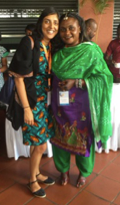
Dr Gursaran Purewal and Florence
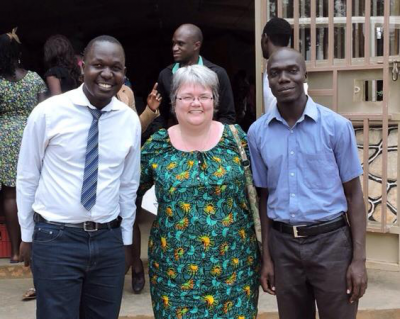
Photo with Ivan and our Cairdeas Trustee Jacqui MacIntosh
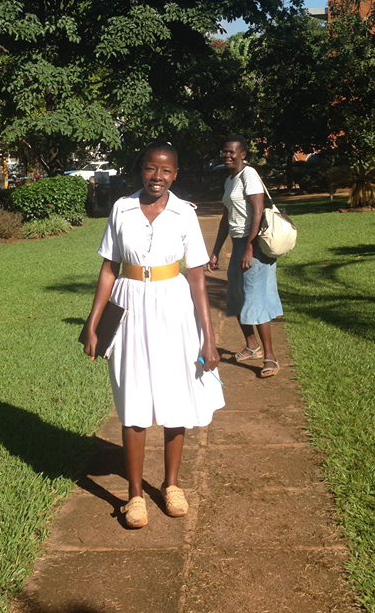
Ester
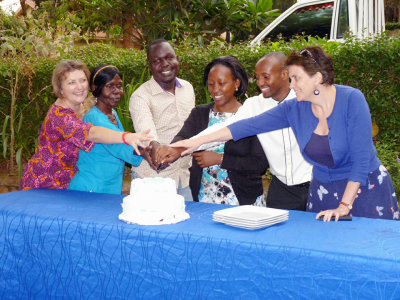
Graduation Celebrations
Welcome back to Cairdeas.org.uk
John Howlett
![]() 15th August 2016
15th August 2016
Hello and welcome to the new Cairdeas site! We’ve been working on the site for over a year and can finally launch it today. Our new home will provide you with:
- The latest information on our work, past and present.
- Updates from our team around the world via our Blog
- A hub for a rich collection of Palliative care resources and links to our global partners
- Information for prospective mentors, volunteers and fundraisers.
- An online donation tool and regular donation information.
We relaunch today to coincide with the APCA conference in Kampala, Uganda. As we have a big global collaborative team in Kampala this is a great opportunities to present our ideas and engage with the Palliative care community in internationally.
Please expect some more posts following the conference.
Thanks
Cairdeas
